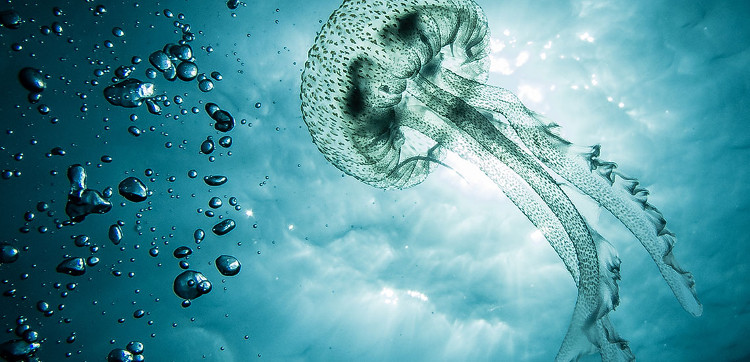Italian scientist calls to eat jellyfish to protect the environment
An Italian scientist proposed a plan to eat jellyfish to prevent uncontrolled development of this animal.
An Italian scientist has proposed a project to encourage eating jellyfish , preventing this animal from overgrowing, adversely affecting the environment and human activities, Mirror on September 28 reported.
Jellyfish have many forms of reproduction. They can separate body parts to form new young or reproduce sexually by laying eggs and fertilizing outside. They can lay up to 45,000 eggs a day.

Jellyfish proliferate quickly threaten marine life and human activities.(Photo: Avoca Ventures).
Climate change makes seawater warm longer, creating favorable conditions for jellyfish to multiply quickly. In recent years, the number of jellyfish has exploded out of control. In 2015, the Suez Canal was expanded, becoming the "highway" for this species to invade the Mediterranean.
A Japanese power plant has tried to kill less jellyfish with a crusher, but accidentally helps them thrive more strongly, according to the New York Times. In 2013, the number of jellyfish booms forced a Swedish nuclear power plant to shut down. Jellyfish also seriously affect salmon farming in Ireland.
The European Commission said that the boom of jellyfish and sea pollution caused many problems and became more serious. The organization also funded researchers to make breakthrough measures to address the situation.
Stefano Piraino, professor of zoology at Salento University, and colleagues proposed the Go Jelly project to encourage people to eat jellyfish. Previously, he had done some research on jellyfish and launched a campaign to protect the beaches from poisonous jellyfish with nets.
Jellyfish can help detect tumors that cause cancer, Piraino said. They also contain lots of collagen and can help beautify the lips. In addition, dishes from jellyfish are also rich in protein and low in cholesterol.
Piraino and the project team believe that climate change and overfishing will make Italians get used to eating jellyfish. In some countries like Japan or China, dishes from jellyfish have long become familiar to people.
- 65 interesting things about jellyfish (1)
- Jellyfish species can 'knock down' American carriers
- 65 interesting things about jellyfish (2)
- Beautiful sparkling jellyfish kingdom
- Nuclear power plants worry about being attacked by jellyfish
- Do you know how jellyfish burn us?
- Alessandro Volta: Outstanding Italian scientist
- Discover strange strange jellyfish of seven colors
- Beauty of jellyfish in the dark
- Startled with the danger of jellyfish invading the oceans
- Strange ocean jellyfish breeding in the aquarium
- Jellyfish cannot 'invade' the planet
 Surprised: Fish that live in the dark ocean still see colors
Surprised: Fish that live in the dark ocean still see colors Japan suddenly caught the creature that caused the earthquake in the legend
Japan suddenly caught the creature that caused the earthquake in the legend A series of gray whale carcasses washed ashore on California's coast
A series of gray whale carcasses washed ashore on California's coast Compare the size of shark species in the world
Compare the size of shark species in the world